7B Unit 1 Dream Home (6)
- 格式:doc
- 大小:43.00 KB
- 文档页数:2
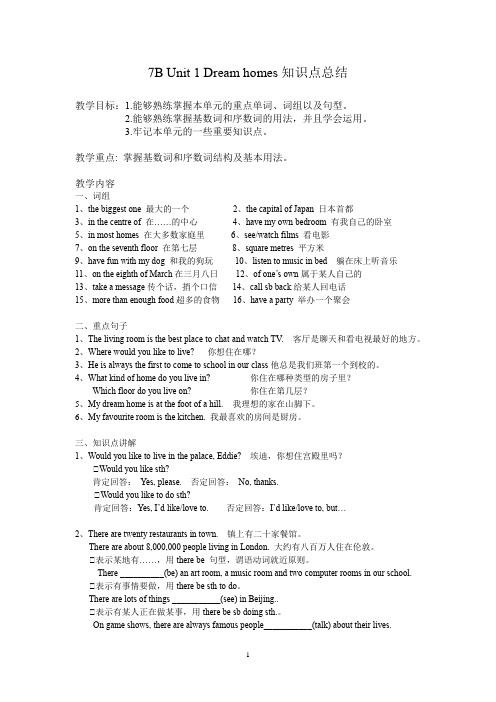
7B Unit 1 Dream homes知识点总结教学目标:1.能够熟练掌握本单元的重点单词、词组以及句型。
2.能够熟练掌握基数词和序数词的用法,并且学会运用。
3.牢记本单元的一些重要知识点。
教学重点: 掌握基数词和序数词结构及基本用法。
教学内容一、词组1、the biggest one 最大的一个2、the capital of Japan 日本首都3、in the centre of 在……的中心4、have my own bedroom 有我自己的卧室5、in most homes 在大多数家庭里6、see/watch films 看电影7、on the seventh floor 在第七层8、square metres 平方米9、have fun with my dog 和我的狗玩10、listen to music in bed 躺在床上听音乐11、on the eighth of March在三月八日12、of one’s own属于某人自己的13、take a message传个话,捎个口信14、call sb back给某人回电话15、more than enough food超多的食物16、have a party 举办一个聚会二、重点句子1、The living room is the best place to chat and watch TV. 客厅是聊天和看电视最好的地方。
2、Where would you like to live? 你想住在哪?3、He is always the first to come to school in our class他总是我们班第一个到校的。
4、What kind of home do you live in?你住在哪种类型的房子里?Which floor do you live on? 你住在第几层?5、My dream home is at the foot of a hill. 我理想的家在山脚下。
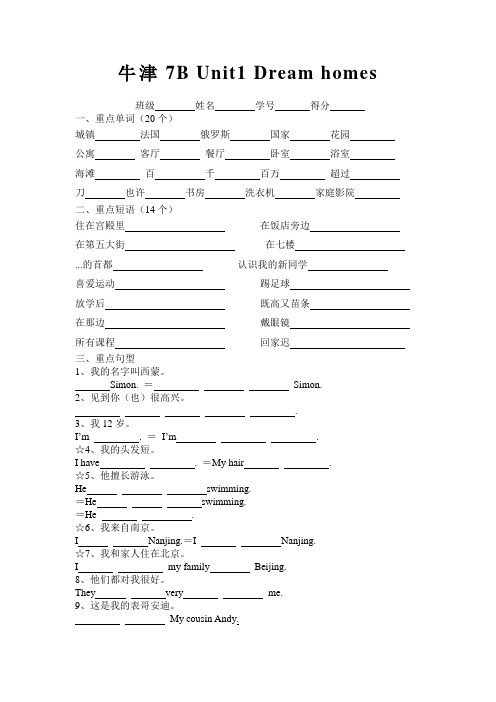
牛津7B Unit1 Dream homes班级姓名学号得分一、重点单词(20个)城镇法国俄罗斯国家花园公寓客厅餐厅卧室浴室海滩百千百万超过刀也许书房洗衣机家庭影院二、重点短语(14个)住在宫殿里在饭店旁边在第五大街在七楼...的首都认识我的新同学喜爱运动踢足球放学后既高又苗条在那边戴眼镜所有课程回家迟三、重点句型1、我的名字叫西蒙。
Simon. =Simon.2、见到你(也)很高兴。
.3、我12岁。
I’m . =I’m .☆4、我的头发短。
I have . =My hair .☆5、他擅长游泳。
He swimming.=He swimming.=He .☆6、我来自南京。
I Nanjing.=I Nanjing.☆7、我和家人住在北京。
I my family Beijing.8、他们都对我很好。
They very me.9、这是我的表哥安迪。
My cousin Andy.牛津7A Unit2 Let’s play sports!班级姓名学号得分一、重点单词(17个)的确,确实网球欣赏,喜爱运动员成员俱乐部空闲的希望梦想变成现实画画购物另外,其他的享乐,乐趣对,组比赛偶像,英雄二、重点短语(12个)一天很多次去游泳……中的一员足球踢得好在他的空闲时间在足球俱乐部喜欢听音乐在周末步行到学校步行回家我的很多学生谈论三、重点句型1、你最喜爱的运动是什么?your sport? =sport you ?2、你呢?you ?3、去游泳怎么样?How about ?4、它使他开心It .5、它使我感到很棒。
It6、李华想参加下一届世界杯赛。
Li Hua in the next .7、我希望他梦想成真I his dream .8、他看起来怎么样?How he .9、他看起来强壮。
He .10、你还喜欢做别的什么事情吗?do you like to do?牛津7A Unit1 语法讲解Be动词的一般现在时:(am、is、are)用途:用来谈论事实(是什么)和状态(怎么样)。
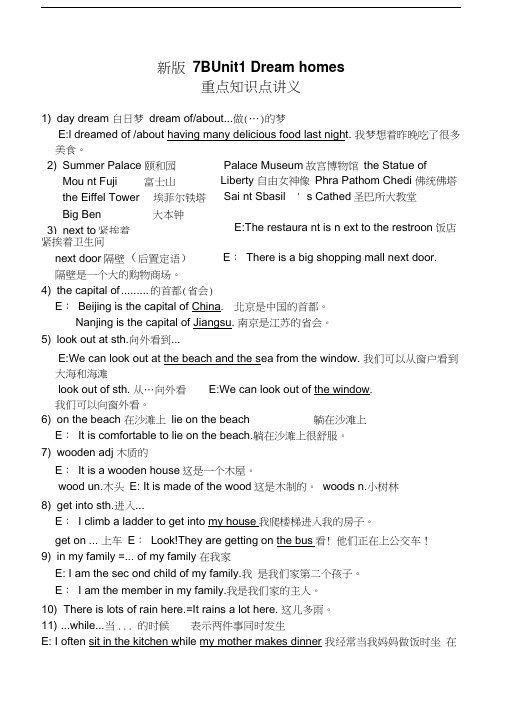
新版 7BUnit1 Dream homes重点知识点讲义1) day dream 白日梦 dream of/about...做(…)的梦E:l dreamed of /about having many delicious food last night. 我梦想着昨晚吃了很多美食。
Palace Museum 故宫博物馆 the Statue of Liberty 自由女神像 Phra Pathom Chedi 佛统佛塔 Sai nt Sbasil ' s Cathed 圣巴所大教堂E:The restaura nt is n ext to the restroon 饭店紧挨着卫生间 next door 隔壁(后置定语)隔壁是一个大的购物商场。
4) the capital of ......... 的首都(省会)E : Beijing is the capital of China. 北京是中国的首都。
Nanjing is the capital of Jiangsu. 南京是江苏的省会。
5) look out at sth.向外看到...E:We can look out at the beach and the sea from the window. 我们可以从窗户看到大海和海滩look out of sth. 从…向外看 E:We can look out of the window.我们可以向窗外看。
6) on the beach 在沙滩上 lie on the beach 躺在沙滩上E : It is comfortable to lie on the beach.躺在沙滩上很舒服。
7) wooden adj 木质的E : It is a wooden house 这是一个木屋。
wood un.木头 E: It is made of the wood 这是木制的。
woods n.小树林8) get into sth.进入...E : I climb a ladder to get into my house 我爬楼梯进入我的房子。
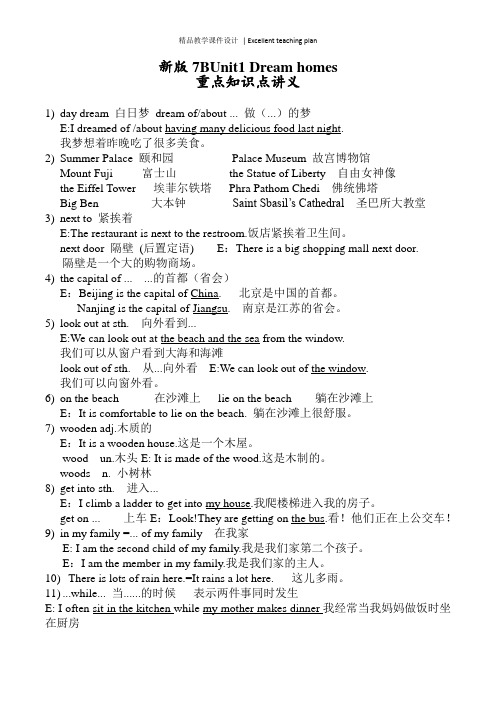
新版7BUnit1 Dream homes重点知识点讲义1)day dream 白日梦dream of/about ... 做(...)的梦E:I dreamed of /about having many delicious food last night.我梦想着昨晚吃了很多美食。
2)Summer Palace 颐和园Palace Museum 故宫博物馆Mount Fuji 富士山the Statue of Liberty 自由女神像the Eiffel Tower 埃菲尔铁塔Phra Pathom Chedi 佛统佛塔Big Ben 大本钟Saint Sbasil’s Cathedral 圣巴所大教堂3)next to 紧挨着E:The restaurant is next to the restroom.饭店紧挨着卫生间。
next door 隔壁(后置定语) E:There is a big shopping mall next door.隔壁是一个大的购物商场。
4)the capital of ... ...的首都(省会)E:Beijing is the capital of China. 北京是中国的首都。
Nanjing is the capital of Jiangsu. 南京是江苏的省会。
5)look out at sth. 向外看到...E:We can look out at the beach and the sea from the window.我们可以从窗户看到大海和海滩look out of sth. 从...向外看E:We can look out of the window.我们可以向窗外看。
6)on the beach 在沙滩上lie on the beach 躺在沙滩上E:It is comfortable to lie on the beach. 躺在沙滩上很舒服。
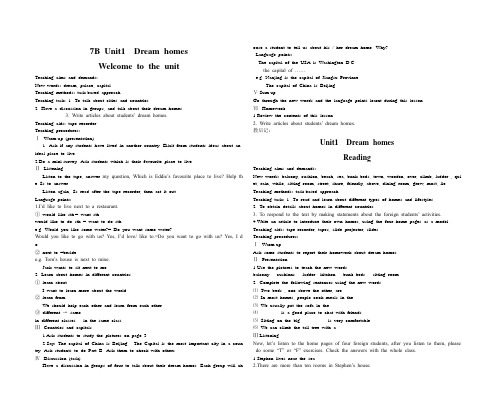
7B Unit1 Dream homesWelcome to the unitTeaching aims and demands:New words: dream, palace, capitalTeaching methods: task-based approachTeaching task: 1. To talk about cities and countries.2. Have a discussion in groups, and talk about their dream homes.3. Write articles about students’ dream homes.Teaching aids: tape recorderTeaching procedures:Ⅰ. Warm-up (presentation)1. Ask if any students have lived in another country. Elicit from students ideas about an ideal place to live.2.Do a mini-survey. Ask students which is their favourite place to live.Ⅱ. ListeningListen to the tape, answer my question, Which is Eddie’s favourite place to live? Help th e Ss to answer.Listen again, Ss read after the tape recorder, then act it out.Language points:1.I’d like to live next to a restaurant.①would like sth.= want sthwould like to do sth = want to do sthe.g. Would you like some water?= Do you want some water?Would you like to go with us? Yes, I’d love/ like to.=Do you want to go with us? Yes, I d o.②next to =besidee.g. Tom’s house is next to mine.Jack wants to sit next to me.2. Learn about homes in different countries.①learn aboutI want to learn more about the world.②learn fromWe should help each other and learn from each other.③different →samein different classes in the same classⅢ. Countries and capitals1.Ask students to study the pictures on page 3.2.Say: The capital of China is Beijing . The Capital is the most important city in a coun try. Ask students to do Part B. Ask them to check with others.Ⅳ. Discussion (task)Have a discussion in groups of four to talk about their dream homes. Each group will ch oose a student to tell us about his / her dream home. Why?Language points:The capital of the USA is Washington D.C.the capital of ……e.g. Nanjing is the capital of Jiangsu Province.The capital of China is Beijing.Ⅴ.Sum-upGo through the new words and the language points learnt during this lesson.Ⅵ. Homework1.Review the contents of this lesson.2. Write articles about students’ dream homes.教后记:Unit1 Dream homesReadingTeaching aims and demands:New words: balcony, cushion, beach, sea, bunk beds, town, wooden, over, climb, ladder , qui et, rain, while, sitting room, street, share, friendly, above, dining room, grow, most, lie Teaching methods: task-based approachTeaching task: 1. To read and learn about different types of homes and lifestyles..2. To obtain details about homes in different countries.3. To respond to the text by making statements about the foreign students’ activities.4.Write an article to introduce their own homes, using the four home pages as a model. Teaching aids: tape recorder, tapes, slide projector, slidesTeaching procedures:Ⅰ. Warm-upAsk some students to report their homework about dream homes.Ⅱ. Presentatione the pictures to teach the new words.balcony cushions ladder kitchen bunk beds sitting room2. Complete the following sentences using the new words.⑴Two beds , one above the other, are .⑵In most homes, people cook meals in the .⑶We usually put the sofa in the .⑷is a good place to chat with friends.⑸Sitting on the big is very comfortable.⑹We can climb the tall tree with a .Ⅲ.ListeningNow, let’s listen to the home pages of four foreign students, after you listen to them, please do some “T” or “F” exercises. Check the answers with the whole class.1.Stephen lives near the sea.2.There are more than ten rooms in Stephen’s house.3.Maddee lives in a wooden house in the hills.4.Maddee has a small family.5.Neil has a TV in the kitchen.6.Neil’s dog sleeps in the sitting room.7.Anna’s flat is on a busy street.8.Anna shares a bedroom with her brother.9.Stephen’s favourite place is the balcony.10.Anna lives in a large flat.Ⅳ. ReadingSs read the articles by yourselves. Then check their reading.Language points:1.We sit on the big floor cushions and look out at the beach and the sea.look out (of) …e.g. Don’t look out of the window in class.look at / look around / look for / look like / look forward to / look after / look up2. I live with my family in a wooden house.= I live with my family in a house made of w ood.wooden(adj.) →wood (n.)e.g. We need some wooden chairs.This house is made of wood.3. I climb a ladder to get into my house. =I get into my house with a ladder.①e.g. I often go to her house to see Uncle Li.Daniel often goes to the shopping mall to play computer games.②get into →get out ofget into the car get out of the car4. I do not have my own bedroom.own(adj./v.) →owner (n.)e.g. I see with my own eyes.Who’s the owner of this pen?= Who owns this pen?5. My family and I often sit in the kitchen while my mother makes dinner.e.g. I am reading books while my brother is watching TV.She called while you were out.6. I share a bedroom with my sister.share sth with sbe.g. The boy shared his toy with other childrenshare in sthe.g. We should share in our sorrows as well as joys.7. Our neighbours are friendly and we are happy here.e.g. I’m friendly with her.be friendly to sbe.g. People are usually friendly to foreign friends.8.Simon wrote down the meaning of some of the words.①write + n. +down=write down +n. write it /them down e.g. Can you write down the words on your book ?= Can you write the words on your book?OK, I’ll write them down.②meaning (n.) →mean(v.)e.g. What’s the meaning of “quick?= What does “quick” me an?9.A garden is the best place to grow flowers.e.g. It’s really a good place to go.I’m hungry. Do you have anything to eat?10.Stephen is lying on his bunk beds.lie →lying tie →tying die →dyingtell a liee.g. Don’t tell a lie any more . It’s not good for you.Ⅴ.Discussion (task)Divide the class into groups of six. Ask students to draw picture of their homes.Students look at their pictures and talk about their homes.Ⅵ.Sum-upGo through the new words and the language points learnt during this lesson.Ⅶ. Homework1. Review the contents of this lesson.2. Write an article to introduce their own homes, using the four home pages as a model.教后记:Unit1 Dream homesVocabulary ﹠GrammarTeaching aims and demands:New words: cupboard, bookshelf, shower, lamp, wardrobe, sink, bath, basin, in front of , opp osite, chalk, air conditioner, below, printer, shelf, top, tidy, sixteen, nineteen, seventy, ninety, thousand, million, arrive, seventh, sixth, come, exam, second, third, fourth, fifth, ninth, eleven th, twelfth, twentieth, soundTeaching difficulties: prepositions of placecardinal numbers & ordinal numbersTeaching methods: task-based approachTeaching task:1.To use prepositions of place to identify specific locations of things..2.To revise and use cardinal numbers in everyday situations , including phone numbers and a mounts of money.3.To understand the purpose of ordinal numbers in terms of ordering things and events.4.To use ordinal and cardinal numbers to talk about schedules, dates, scores and results. Teaching aids: tape recorderTeaching procedures:Ⅰ. Warm-upAsk the student on duty to give a free talk.Ⅱ. V ocabularyAsk the students how many words they already know about furniture. Then teach furnitu re. Use pictures to teach other words. e.g. chair, cupboard, lamp, sofa, table, wardrobe…Ask the students to write the names under the pictures(Page 75).Ⅲ.Grammar1.Prepostitions of placeWe use prepositions of place to say where things are. Prepositions of place: above, at, behin d, below, beside, between, in, in front of , inside, next to, on , opposite, over, under.e.g. Millie sits in front of me.Amy sits between Millie and Simon.Kitty sits next to Sandy.Sandy sits between Kitty and me.Simon sits in front of Kitty.The window is opposite the door.The chalk is on the teacher’s des k.Language points:⑴above, over, onabove →(反) below表示位置高于某物在其上方,并不表示正上方。
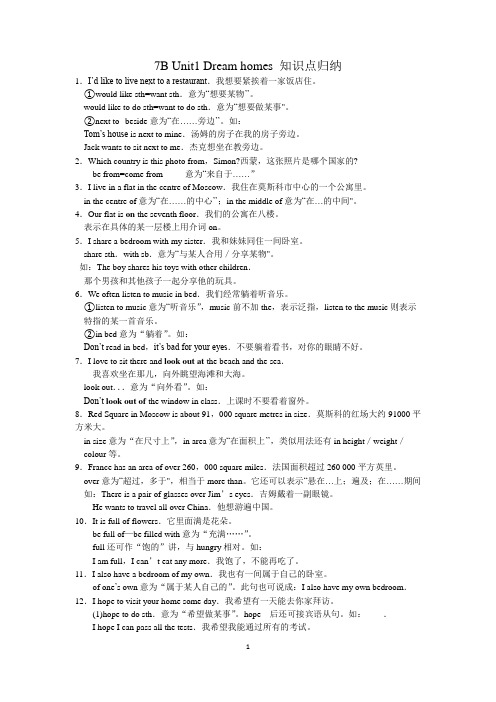
7B Unit1 Dream homes 知识点归纳1.I’d like to live next to a restaurant.我想要紧挨着一家饭店住。
①would like sth=want sth.意为“想要某物’’。
would like to do sth=want to do sth.意为“想要做某事"。
②next to--beside意为“在……旁边’’。
如:Tom’s house is next to mine.汤姆的房子在我的房子旁边。
Jack wants to sit next to me.杰克想坐在教旁边。
2.Which country is this photo from,Simon?西蒙,这张照片是哪个国家的?be from=come from 意为“来自于……”3.I live in a flat in the centre of Moscow.我住在莫斯科市中心的一个公寓里。
in the centre of意为“在……的中心’’;in the middle of意为“在…的中间"。
4.Our flat is on the seventh floor.我们的公寓在八楼。
表示在具体的某一层楼上用介词on。
5.I share a bedroom with my sister.我和妹妹同住一间卧室。
share sth.with sb.意为“与某人合用/分享某物"。
如:The boy shares his toys with other children.那个男孩和其他孩子一起分享他的玩具。
6.We often listen to music in bed.我们经常躺着听音乐。
①listen to music意为“听音乐”,music前不加the,表示泛指,listen to the music则表示特指的某一首音乐。
②in bed意为“躺着”。
Unit 1 Dream homes一.词汇精讲1. next to(1)next to意为“紧邻,在……近旁”相当于介词beside或者短语close to,后接表示地点的名词或者代词例如:His room is next to mine. = His room is beside mine. 他的房间紧挨着我的房间。
(2)next to还可以意为“仅次于”。
例如:It is the largest city next to London. 这是仅次于伦敦的最大都市。
2. capital(1)capital 名词,意为“首都,省会”。
“the capital of …”意为“……的首都”。
例如:Beijing is the capital of China. 北京是中国的首都。
(2)capital 作名词还可以意为“省会,大写字母”。
例如:Zhengzhou is the capital of Henan Province. 郑州是河南省的省会。
3. centrecentre 名词,意为“中心”,“in the centre of …”意为“在……的中心”。
例如:The tower is in the centre of the town. 那座塔位于城镇的中心。
There is a big table in the centre of the room. 房子中央有一个大桌子。
【拓展】centre 和middle的辨析(1)centre 指圆形,球形或市区等的中心。
例如:the centre of the circle圆心(2)middle 指长形物体的中间、道路的中间或者一段时间的中间。
例如:in the middle of the road在路中间in the middle of night在午夜4. shareshare 动词,意为“合用,分享”。
例如:There aren’t enough books, so we have to share. 书不够,所以我们必须得合用。
7B Unit1 Dream homes 知识归纳与拓展【重点词汇】1. shareshare作及物动词,意为“分享”。
常用结构:share sth. with sb.意为“和某人合用某物;和某人分享某物”。
如:I'm afraid you have to share a table with others.我恐怕你得和别人合用一张桌子。
I often share my snacks with my classmates.我经常和同学分享零食。
2. dreamdream作名词时,意为“梦,梦想”;作形容词时,意为“理想的,不切实际的”;作动词时,意为“做梦”,常用于结构:dream of/about...(梦到……)或dream of/ about doing sth.梦想做某事。
如:Millie has a dream to have a big house米莉梦想拥有一幢大房子My dream house is a house with a big garden.我梦寐以求的房子是一幢带有大花园的房子。
I dreamed of my English teacher last night.我昨晚梦到了我的英语老师Amy dreams of being a singer when she grows up.埃米梦想长大后成为一名歌手。
3. ownown作形容词.意为“自己的,属于自己的”,常和形容词性物主代词连用,构成短语of one's own,表示“属于某人自己的”,on one's own = alone,意为“独自地”。
own作动词时,表示“拥有”。
如:I have my own computer我有属于我自己的电脑。
That's a car of her own.那是她自己的汽车。
He lives on his own.他一个人生活。
All of the teachers in our school own computers.我们学校所有的老师都有电脑。
7B Unit1 Dream Homes教学案Comic strip and Welcome to the unit主备人____ 执教者【教学目标】1.谈论学生自己理想的居所,引导学生思考不同的居住环境。
2.谈论不同国家的标志性建筑。
3.认识不同国家及其首都的英语表达方式。
【教学重点、难点】1.重点:谈论学生自己理想的居所。
2.难点:关于国家和其对应的形容词。
【教学过程】一、课前预习:见导学案二、课堂探究:Step 1. Greetings Free talkStep 2.Check out the previewStep 3. Presentation1、PPT呈现世界地图2、看世界地图并学习课本中六个国家的名称。
There are about 200 countries in the world. Which countries do you know of ?3、介绍课本六个国家中的标志性景点。
These countries are very famous and quite beautiful. I have some pictures of them. Do you know of them?Step 4. Practice1、完成书本P7 A部分的练习2、用英语描述不同的国家,让学生猜并说出国家的名称。
3、展示课本中六个国家的景点与学生进行交流。
T:What place is this?Which country is it in?What do you think of this place?Do you want to visit it?4、学生听P7的B部分录音,回答问题。
1).What country are they talking about?2).What is in the photo?3). Is Mount Fuji in Tokyo?5、学生集体朗读对话Step 5. Presentation展示Eddie和Hobo的对话图片(PPT呈现)听录音回答问题1).Which is Eddie’s favorite restaurant?2).Why does he like the biggest one?1、学生集体朗读对话2、分角色朗读对话三、语言点点拨1、Would you like…?==Do you want…?你想要什么?Would you like sth?其回答为Yes, please. No, tkanks/thank you.Would you like to do sth?其回答为Yes, I’d like/love to. I’d like to, but…ΔWould you like to go to the park with me? Yes, I’d like/love to.否定回答I’d like to, but I have to look after my sister.2、next to 紧靠着,紧挨着==besideΔ Lily sits next to Amy.== Lily sits beside Amy.3、capital 名词,意为“首都” the capital of ……的首都ΔThe capital of Japan is Tokyo.【课堂巩固】一、根据句意和首字母或中英文提示完成单词:1.My __________ (梦想中的) home is a wooden house with many green trees around it .2.— Which is the c __________ of China ? —Beijing .3.If you go to Beijing one day , I’d like you to visit the Summer P __________ (place that theking lives in)4.The Green family like living in China , and Shanghai is their f __________ city .5.Now many young people like to go out and eat with their friends at __________ (餐馆) orhotels .6.We all know Beijing is the c________ of China.二、用所给词的适当形式填空:1.Would you like __________ (study) in our school ?2.There are many __________ (country) in the world , Russia is the __________ (big) one .lie was born in Beijing . She is a __________ (China) .4.Sam is from England , so he is an __________ (England)boy .5.Coke and ice-cream are my __________ (favourite) .6. I’d like _________ (go) to visit your parents tomorrow.7. England and Austria are my favourite __________ (country).8. The ______ (big) cake is Eddie’s favourite.9. ---Where do you live ? --- I live in __________ (five) Street.【教学反思】7B Unit1 Dream Homes教学案Reading1主备人______ 执教者【教学目标】1.了解不同国家居住环境的情况。